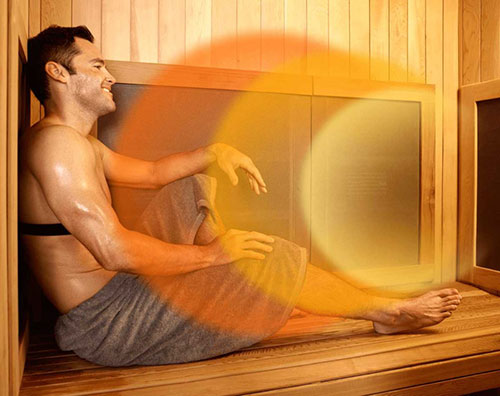Infrared Sauna Therapy for Better Blood Flow
Posiadanie i używanie sauny Sunlighten do terapii podczerwienią jest jak pasywny trening cardio - kiedy tylko tego potrzebujesz!
As a health sauna, Sunlighten heats your muscles with infrared rays and produces an increase in blood flow similar to regular exercise. In fact, blood flow during infrared sauna use has been reported to rise from a normal rate of 5-7 quarts per minute to as much as 13 quarts per minute. ¹
The elevation in body temperature from a Sunlighten sauna session also produces an increase in blood flow that mirrors the benefits of a passive cardiovascular workout. Regular infrared sauna use – especially in the mid-infrared range – has been shown to significantly stimulate blood flow, even after your health sauna session is completed. A cardio workout has never been so relaxing! Another benefit of improved circulation from Sunlighten sauna use is quick muscle recovery – after your regular workouts. The increased peripheral circulation from our infrared heat reduces inflammation, decreases pain and speeds healing, all important steps in helping the body recover from strenuous activity.

The Experts Love Infrared Saunas to Improve Circulation
“…the cardiovascular cleansing properties of Sunlighten saunas allow the circulatory system to have increased circulation and oxygenation while lowering blood pressure.” -Dr. Rachel West
More health experts recommend Sunlighten saunas than any other because of proven effectiveness. Dr. Mark Hyman, New York Times bestselling author and editor-in-chief of the peer-reviewed medical journal Alternative Therapies in Health & Medicine, owns a Sunlighten sauna and says, “Sunlighten saunas improve circulation, help with weight loss, balance blood sugar and improve detoxification.”
“If you analyze the peer reviewed data, full spectrum infrared sauna therapy would be a multibillion drug if it came in a pill. The ability to heal endothelium and improve symptoms and prognosis for congestive heart failure and coronary artery disease is remarkable. Sunlighten saunas are the only infrared saunas clinically shown to lower blood pressure and reduce belly fat, both contributing factors to a healthy heart.”
Dr. Joel Kahn, America’s healthy heart doctor.

How to Improve Circulation When You Take a Sauna
One sure way to improve circulation in your Sunlighten infrared sauna is to sit back and relax! Just by taking an infrared sauna, you are already improving circulation. Want to help your body even more? Use these helpful tips to naturally increasing blood circulation while taking a sauna.
1. Stretch While in the Sauna
During your Sunlighten Sauna session, perform stretches or a palates routine in order to make the most of your increased blood circulation. According to one study, this could give you better flexibility, particularly in the hips, hamstrings and lower back. View study for stretching guide.
2. Take a Sauna after Working Out
Not only will fatigued muscles and a tired body appreciate the relaxation of a sauna session after a workout, but the improved blood circulation you experience in a sauna will help ease the aches and pains, loosen the tight spots and increase the rate at which your muscles heal.
3. Use Pure Sweat Cream
Our Sunlighten Pure Sweat Cream triples the amount of sweating, therefore increasing blood circulation while also enhancing vasodilatation, effectively lowering your blood pressure.
4. Take Advantage of the Ergonomic Bench
The Sunlighten mPulse home sauna series offers a chiropractic-consulting bench design that reduces stress on the body and allows for natural improved blood circulation while taking a sauna. So when you are not working out, just sit back and let the chair do the work. Our Signature sauna benches are also 10 percent deeper than the standard for the ultimate comfort and are removable to create room for stretching.